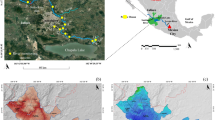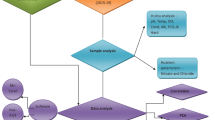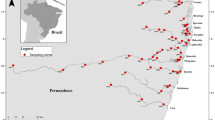Abstract
Many Mediterranean rivers are characterized by an inter-annual climatic variability, additionally intensified by climate change. Moreover, these rivers have limited extensions and a reduced dilution capacity which make them vulnerable to human pressures, especially to water pollution. During the 1970s, the Besòs river basin had historically suffered the continuous discharge of untreated residual water, leading to be considered as the most polluted river in Europe. During the 1990s and 2000s, environmental laws such as the Catalan Treatment Plan and the Water Framework Directive (2000/60/EC) were implemented to resolve the problem. Consequently, the number of wastewater treatment plants (WWTPs) and long-term monitoring programs to assess the ecological status increased in the territory. In order to evaluate these changes, this study assesses the biological quality status (IBMWP, QBR and IPS) in the Besòs river water at three spatial scales (headwater, middle and lower sections). Our results clearly show that water quality across the basin has been improved. This improvement has become more significant after the implementation of new treatment systems. The trends in ammonia concentrations (NH4+, in mg/L) and conductivity (EC, in μS/cm) discharged from 13 selected WWTPs during the period 2000–2018 displays a clear decreasing tendency. Finally, we have applied a thorough statistical analysis to the IBMWP dataset to demonstrate the positive influence of the treatment systems on the ecological quality status across the river basin. We conclude that the implementation and enforcement of environmental laws are valid and effective tools to improve water quality in Mediterranean rivers.
Highlights
• Wastewater treatment plant upgrading has positive effects on biological quality status.
• High NH4+ and conductivity levels provoke alterations on biological quality status.
• Correct quality status (IBMWP) is reached when NH4+ < 1 mg/L and EC is within 500–2000 μS/cm.




Similar content being viewed by others
Data Availability
Data available in a public (institutional, general or subject specific) repository that does not issue datasets with DOIs (non-mandated deposition).
References
Agència Catalana de l’Aigua (ACA) (2006) BIORI, Protocol d’avaluació de la qualitat ecològica dels rius. Departament de Medi Ambient i Habitatge, Generalitat de Catalunya http://aca.gencat.cat/web/.content/20_Aigua/05_seguiment_i_control/01_protocols/03_Protocol_rius.pdf.
Agència Catalana de l’Aigua (ACA) (2008) Water in Catalonia: diagnosis and proposed actions: Significant water management issues raised within the compilation of the River Basin District Management Plan for Catalonia I. Departament de Medi Ambient i Habitatge 1. Recursos hidràulics – Explotació – Catalunya 628.1 (467.1). https://aca-web.gencat.cat/aca/documents/ca/publicacions/aigua_a_catalunya/aigua_a_catalunya_en.pdf. Accessed 5 September 2019.
Agència Catalana de l’Aigua (ACA) (2017) 500 depuradores. El sanejament a Catalunya, un model pioner http://aca.gencat.cat/web/.content/20_Aigua/01_gestio_del_cicle_de_laigua/03_Depuracio/D02-500_EDAR_ca.pdf. Accessed 5 September 2019.
Alba-Tercedor J, Jáimez- Cuellar P, Álvarez M, Avilés J, Bonada N, Casas J, Mellado A, Ortega M, Pardo I, Prat N, Rieradevall M, Robles S, Sáinz-Cantero CE, Sánchez-Ortega A, Súarez ML, Toro M, Vidal-Abarca MR, Vivas S, Zamora-Muñoz C (2002) Caracterización del estado ecológico de ríos mediterráneos ibéricos mediante el índice IBMWP (antes BMWP’). Limnetica 21 (3–4): 175–185. https://www.limnetica.com/documentos/limnetica/limnetica-21-2-p-175.pdf.
Angeler GD, Allen RC, Birgé EH, Drakare S, McKie GB, Johnson KR (2014) Assessing and managing freshwater ecosystems vulnerable to environmental change. Ambio 43(1):113–125. https://doi.org/10.1007/s13280-014-0566-z.
Benejam L, Angermeier PL, Munné A, García-Berthou E (2010) Assessing effects of water abstraction on fish assemblages in Mediterranean streams. Freshw Biol 55:628–642. https://doi.org/10.1111/j.1365-2427.2009.02299.x
Blondel J, Aronson J, Bodiou JY, Boeuf G (2010) The Mediterranean region. Biological diversity in space and time. The quarterly review of biology 85 (4): 497, the University of Chicago press. https://doi.org/10.1086/656852
Bonada N, Resh VH (2013) Mediterranean climate streams and rivers: geographically separated but ecologically comparable freshwater systems. Hydrobiologia 719:1–29. https://doi.org/10.1007/s10750-013-1634-2
Boulton AJ (1999) An overview of river health assessment: philosophies, practice, problems and prognosis. Freshw Biol 41:469–479. https://doi.org/10.1046/j.1365-2427.1999.00443.x
Carceller F, Iglesias V, Munné A, Prat N, Rieradevall M, Carmona JM, Font X, Chacón G, Fons J, Ibàñez JJ, Romo A (1999) Estudi de la biodiversitat a la conca del Besòs. Consorci per a la Defensa de la Conca del Besòs 180
Cemagref A (1982) A study on the biological methods of qualitative assessment of water quality. A report of the Water Quality Division Lyon-Outflow Rhône River section catchment Pierre-Bénite 218 https://www.documentation.eauetbiodiversite.fr/notice/etude-des-methodes-biologiques-d-appreciation-quantitative-de-la-qualite-des-eaux0.
Collen B, Loh, J, Whitmee S, McRae L, Amin R, Baillie JEM (2009) Monitoring change in vertebrate abundance: the living planet index. Conserv Biol 23: 317–327.https://doi.org/10.1111/j.1523-1739.2008.01117.x.
Consell Assessor per al Desenvolupament Sostenible de la Generalitat de Catalunya (CADS), Institut d’Estudis Catalans (IEC) (2017) Tercer informe sobre el canvi climàtic a Catalunya. http://cads.gencat.cat/web/.content/Documents/Publicacions/tercer-informe-sobre-canvi-climatic-catalunya/TERCER_INFORME_CANVI_CLIMATIC_web.pdf. ISBN: 978-84-9965-317-4. .
Consorci Besòs Tordera (2019) Memòries anuals de gestió dels sistemes de tractament: https://besos-tordera.cat/que-fem/sistemes-de-sanejament/. Accessed 28 January 2020.
Cudennec C, Leduc C, Koutsoyiannis D (2007) Dryland hydrology in Mediterranean regions - a review. Hydrol Sci J 52:1077–1087. https://doi.org/10.1623/hysj.52.6.1077
Descy JP, Coste MA (1991) A test of methods for assessing water quality based on diatoms. Int Assoc Theor Appl Limnol 24:2112–2116. https://doi.org/10.1080/03680770.1989.11899905
Dudgeon D, Arthington AH, Gessner MO, Kawabata ZI, Knowler DJ, Lévêque C, Naiman RJ, Prieur-Richard AH, Soto D, Stiassny MLJ, Sullivan CA (2005) Freshwater biodiversity: importance, threats, status and conservation challenges. Biol Rev 81(02):163–182. https://doi.org/10.1017/S1464793105006950
Ene A, Popescu IV, Stihi C, Gheboianu A, Radulescu C, Tigau N, Gosav S (2010) Assessment of river water quality in central and eastern parts of Romania using atomic GF5 and optical methods. Journal of Science and Arts 1 (12): 113–118. https://agris.fao.org/agris-search/search.do?recordID=AV2012080575. Accessed 14 August 2018.
European Commission (1991) Council Directive 91/271/ECC: https://eur-lex.europa.eu/legal-content/ES/TXT/?uri=celex%3A31991L0271. Accessed 13 August 2018.
European Commission (2000) Water Framework Directive (WFD) 60/2000/EC. https://eur-lex.europa.eu/resource.html?uri=cellar:5c835afb-2ec6-4577-bdf8-756d3d694eeb.0008.02/DOC_1&format=PDF.
European Environment Agency (EEA) (2008) The problems of water stress. European Environment Agency: https://www.eea.europa.eu/publications/92-9167-025-1/page003.html. Accessed 13 August 2018.
Faure MG (1995) Enforcement issues for environmental legislation in developing countries: http://archive.unu.edu/hq/library/Collection/PDF_files/INTECH/INTECHwp19.pdf.
Fortuño P, Bonada N, Prat N Acosta R, Cañedo-Argüelles M, Castro D, Cid N, Múrria C, Pineda D, Rocha K, Sória M Tarrats P, Verkaik I (2018) Efectes del Canvi Ambiental en les comunitats d’organismes dels RIus MEDiterranis (CARIMED). Informe 2017. Diputació de Barcelona. Àrea d'Espais Naturals (Estudis de la Qualitat Ecològica dels Rius 27): 80 pages. http://www.ub.edu/barcelonarius/web/index.php/informe-2017. .
Garg V, Bhaskar N, Praveen T, Shiv A, Prasun G, Shushil S (2019) Human-induced land use and land cover change and its impact on hydrology. HydroResearch 1: 48–56.https://doi.org/10.1016/j.hydres.2019.06.001.
Gatica EA, Almeida CA, Mallea MA, del Corigliano MC, González P (2012) Water quality assessment, by statistical analysis, on rural and urban areas of Chocancharava River (Río Cuarto), Córdoba, Argentina. Environ Monit Assess 184: 7257–7274.https://doi.org/10.1007/s10661-011-2495-7.
Generalitat de Catalunya (1995) Pla de Sanejament de Catalunya. https://aca-web.gencat.cat/aca/documents/ca/legislacio/resolucio/resoldogc_mab_2964_2003.pdf. .
Gherardi F, Corti C, Gualtieri M (2009) Environmental Laws and their reinforcement. Volume. II. Biodiversity, conservation and habitat management: an overview. In a. Dan Tarlock and John C. Dernbach (Ed.) Oxford, United Kingdom: Eolss publishers co.ltd.
Gordi J. (2005) El Paisatge fluvial a la conca del Besòs. Ahir, avui, i demà?. Granollers, Spain: Consorci per a la defensa de la conca del riu Besòs. ISBN 978-84-609-8660-7.
Griffiths JA, Chan FKS, Zhu F, Wang V, Higgitt DL (2017) Reach-scale variation surface water quality in a reticular canal system in the lower Yangtze River Delta region, China. J Environ Manag 196:80–90. https://doi.org/10.1016/j.jenvman.2017.02.079
Gudmundsson L, Seneviratne SI (2016) Anthropogenic climate change affects meteorological drought risk in Europe. Environ Res Lett 11(4):044005. https://doi.org/10.1088/1748-9326/11/4/044005
Hermoso V, Clavero M (2011) Threatening processes and conservation management of endemic freshwater fish in the Mediterranean basin: a review. Mar Freshw Res 62(3):244–254. https://doi.org/10.1071/MF09300
James AL, Marcus AW (2006) The human role in changing fluvial systems: retrospect, inventory and prospect. Geomorphology 79(3–4):152–171. https://doi.org/10.1016/j.geomorph.2006.06.017
Mayo S, Maneja R, Boada M (2008) Els sistemes socioecològics de la conca de la Torera. Barcelona. Institució Catalana d’Història Natural: 541 pages. ISBN 978-84-7283-983-0.
Mediterranean Experts on Climate and environmental Change (MedECC Network) (2019) Risk associated to climate and environmental changes in the Mediterranean region. A preliminary assessment by the MedECC network. Science-policy interface-2019: https://www.medecc.org/. Accessed 14 August 2019.
Meyer JL (1997) Stream health: incorporating the human dimension to advance stream ecology. J N Am Benthol Soc 16:439–447. https://doi.org/10.2307/1468029
Momba MNB, Osode AN, Sibewu M (2006) The impact of inadequate wastewater treatment on the receiving water bodies—case study: Buffalo City and Nkokonbe municipalities of the eastern Cape Province. Water SA 32(5). https://doi.org/10.4314/wsa.v32i5.47854
Monda DP, Galat DL, Finger SE (1995) Evaluating ammonia toxicity in sewage effluent to stream macroinvertebrates: I. A multilevel approach Archives of Environmental Contamination and Toxicology 28:378–384. https://doi.org/10.1007/BF00213116
Munné A, Prat N (2009) Use of macroinvertebrate-based multimeric indices for water quality evaluation in Spanish Mediterranean rivers: an intercalibration approach with the IBMWP index. Hydrobiologia 268(1):203–225. https://doi.org/10.1007/s10750-009-9757-1
Munné A, Solà C, Prat N (1998) QBR: Un índice rápido para la evaluación de la calidad de los ecosistemas de ribera. Tecnología del Agua 175:20–37 ISSN 0211-8173
Navarro-Ortega A, Sabater S, Barceló D (2014) Scarcity and multiple stressors in the Mediterranean water resources: the SCARCE and GLOBAQUA research projects. Contributions to Science 10:193–205. https://doi.org/10.2436/20.7010.01.203
Nõges P, Van de Bund W, Cardoso AC, Heiskanen AS (2007) Impact of climatic variability on parameters used in typology and ecological quality assessment of surface waters- implications on the water framework directive. Hydrobiologia 584(1):373–379. https://doi.org/10.1007/s10750-007-0604-y
Osode AN, Okoh AI (2009) The impact of discharged wastewater final effluent on the physicochemical qualities of a receiving watershed in a sub-urban community of the eastern Cape Province. Clean. Soil, Air, Water 37:938–944. https://doi.org/10.1002/clen.200900098
Otero I, Boada M, Badia A, Pla E, Vayreda J, Sabaté S, Gracia CA, Peñuelas J (2011) Loss of water availability and stream biodiversity under land abandonment and climate change in a Mediterranean catchment (Olzinelles, NE Spain). Land Use Policy 28(1):207–2018. https://doi.org/10.1016/j.landusepol.2010.06.002
Pinto AL, Varandas S, Coimbra AM, Carrola J, Fontaínhas-Fernandes A (2010) Mullet and gudgeon liver histopathology and macroinvertebrate indexes and metrics upstream and downstream from a wastewater treatment plant (Febros River—Portugal). Environmental Monitoring Assessment 169:569–585. https://doi.org/10.1007/2Fs10661-009-1197-x
Poff LN, Allan D, Bain MB, Karr JR, Prestegaard KL, Richter BD, Sparks RE, Stromberg JC (1997) The natural flow regime: a paradigm for river conservation and restoration. Bioscience 47:769–784. https://doi.org/10.2307/1313099
R Development Core Team (2014) R: a language and environment for statistical computing. R Foundation for Statistical Computing, Vienna, Austria
Reid AJ, Carlson AK, Creed IF, Eliason EJ, Gell PA, Johnson PTJ, Kidd KA, MacCormack TJ, Olden JD, Ormerod SJ, Smol JP, Taylor WW, Tockner K, Vermarie JC, Dudgeon D, Cooke SJ (2019) Emerging threats and persistent conservation challenges for freshwater biodiversity. Biol Rev 94:849–873. https://doi.org/10.1111/brv.12480
Rosenberg DM, Resh, VH (1993) Introduction to Freshwater Biomonitoring and Benthic Macroinvertebrates. Freshwater Biomonitoring and Benthic Macroinvertebrates, Chapman/Hall, New York, 1–9. 488, 1–9. https://doi.org/10.1002/aqc.3270040110.
Saadi S, Todorovic M, Tanasijevic L, Pereira LS, Pizzigali C, Lionello P (2015) Climate change and Mediterranean agriculture: impacts on winter wheat and tomato crop evapotranspiration, irrigation requirements and yield. Agric Water Manag 147:103–115. https://doi.org/10.1016/j.agwat.2014.05.008
Sànchez-Mateo S, Boada M (2011) Anàlisi socioecològica del Vall de Santa Fe (massís del Montseny): la transformació del paisatge a través de la història ambiental. https://ddd.uab.cat/record/98755?ln=ca. .
Sànchez-Mateo S, Mas-Ponce, A Gordillo J, Guardia A, Pino J, Boada M (2017) Avaluació de l’estat de qualitat dels cursos fluvials de la conca del Besòs (1997–2017). Consorci Besòs Tordera. https://besos-tordera.cat/qui-som/estudis-i-projectes/. .
Snyder H (2019) Literature review as a research methodology: an overview and guidelines. J Bus Res 104:333–339. https://doi.org/10.1016/j.jbusres.2019.07.039
Su J, Ji D, Lin M, Chen Y, Sun Y, Huo S, Zhu J, Xi B (2017) Developing surface water quality standards in China. Resour Conserv Recycl 117:294–303. https://doi.org/10.1016/j.resconrec.2016.08.003
Tabacchi E, Correll DL, Hauer R, Pinay G, Planty-Tabacchi AM, Wissmar RC (1998) Development, maintenance and role of riparian vegetation in the river landscape. Freshw Biol 40:497–516. https://doi.org/10.1046/j.1365-2427.1998.00381.x
Turak E, Flack LK, Norris RH, Simpson J, Waddell N (1999) Assessment of river condition at a large spatial scale using predictive models. Freshw Biol 41:283–298. https://doi.org/10.1046/j.1365-2427.1999.00431.x
United Nations. Water for Life Decade (2014) Water Quality.
Vega M, Pardo R, Barrado E, Deban L (1998) Assessment of seasonal and polluting effects on the quality of river water by exploratory data analysis. Water Res 32(12):3581–3592. https://doi.org/10.1016/S0043-1354(98)00138-9
Voza D, Vuković M, Takić LJ, Nikolić DJ, Mladenović-Ranisavljević I (2015) Application of multivariate statistical techniques in the water quality assessment of Danube River, Serbia. Archives of Environmental Protection 41(4):96–103. https://doi.org/10.1515/aep-2015-0044
Ward JV, Bretschko G, Brunke M, Danielopol D, Gibert J, Gonser T, Hildrew AG (1998) The boundaries of river system: the metazoan perspective. Freshw Biol 40:531–569. https://doi.org/10.1046/j.1365-2427.1998.00368.x
World Wildlife Fund (WWF) (2018) Living planet index (LPI). Living Planet Index:. Accessed 14 August 2018.
Wright JF, Furse MT, Moss D (1998) River classification using invertebrates: RIVPACS applications. Aquat Conserv Mar Freshwat Ecosyst 8:617–631 https://doi.org/10.1002/(SICI)1099-0755(199807/08)8:4<617::AID-AQC255>3.0.CO;2-%23
Acknowledgements
We especially express our gratitude to Manel Isnard, Fluvial Systems responsible of the Consorci Besòs Tordera, Josep Mas-Pla, University of Girona, and Maeve O’Reilly for sharing their expertise during the course of this research. Datasets of NH4+ and EC discharged by the WWTPs of Besòs river basin were provided by the Consorci Besòs Tordera, which data repositories are openly available at Consorci Besòs Tordera (2019; https://besos-tordera.cat/que-fem/sistemes-de-sanejament/). The biological (IBMWP index (macroinvertebrates) and IPS index (diatom algae) and hydromorphological (QBR, riparian vegetation) quality status data of the Besòs river basin from 1997 to 2017 were extracted from Sànchez-Mateo et al. (2017) (https://besos-tordera.cat/qui-som/estudis-i-projectes/) and Fortuño et al. (2018) (http://www.ub.edu/barcelonarius/web/index.php/informe-2017). R-code that supports the findings of this study are available in the Supplementary Material II.
Funding
This research has been supported by the research project of Observatori Rivus (UAB-ICTA) funded by the Fundació Rivus, Consorci Besòs Tordera, the city councils of Arbúcies, Hostalric, Malgrat de Mar, Sant Celoni and Santa Maria de Palautordera.
Author information
Authors and Affiliations
Contributions
All authors contributed to the study conception and design. The conceptual framework of the paper was performed by Eduard Pla and Sònia Sànchez-Mateo. Material preparation and the data compilation were performed by Antoni Mas-Ponce and the analysis were performed by Roberto Molowny-Horas. The first draft of the manuscript was written by Antoni Mas-Ponce and all authors commented on previous versions of the manuscript. All authors read and approved the final manuscript.
Corresponding author
Ethics declarations
Conflict of Interest
The authors declare that they have no conflict of interest.
Additional information
Publisher’s Note
Springer Nature remains neutral with regard to jurisdictional claims in published maps and institutional affiliations.
Supplementary Information
ESM 1
(PDF 1089 kb)
Rights and permissions
About this article
Cite this article
Mas-Ponce, A., Molowny-Horas, R., Pla, E. et al. Assessing the Effects of Wastewater Treatment Plant Effluents on the Ecological Quality Status in a Mediterranean River Basin. Environ. Process. 8, 533–551 (2021). https://doi.org/10.1007/s40710-021-00498-z
Received:
Accepted:
Published:
Issue Date:
DOI: https://doi.org/10.1007/s40710-021-00498-z




